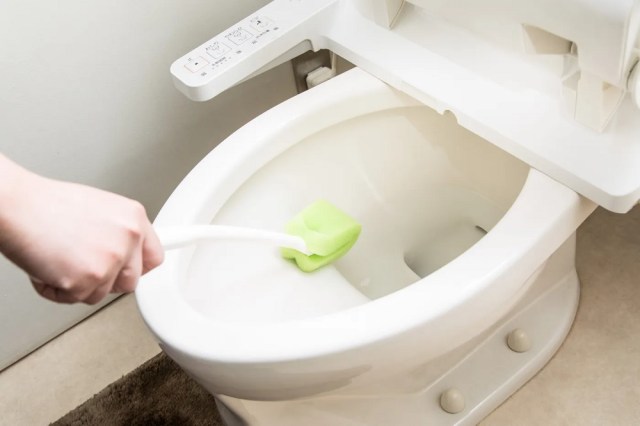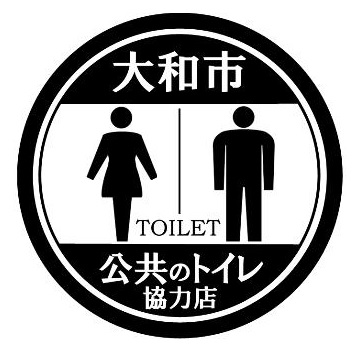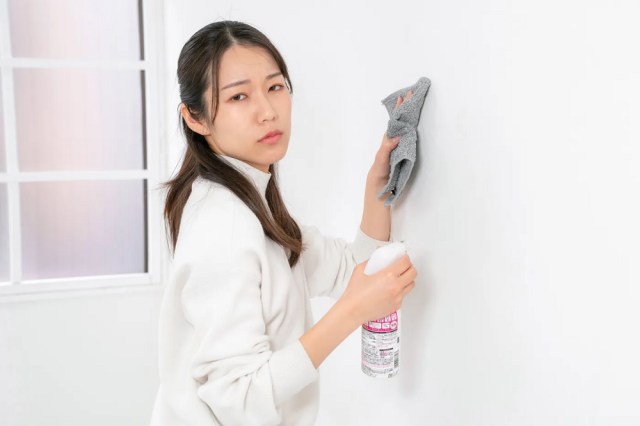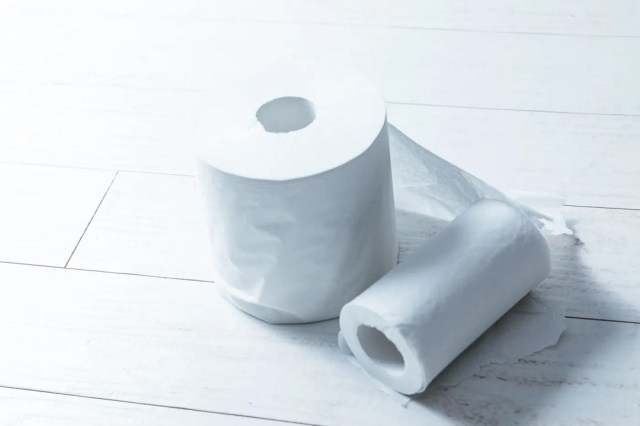
Free toilet paper isn’t worth the potential risks and smells, opponents feel.
The city of Yamato, Kanagawa Prefecture, has a problem. It doesn’t have enough public restrooms.
That’s the conclusion the city government has come to after comparing its roughly 242,000 residents to its mere 46 public restrooms, mostly in train stations and parks. That number of public restrooms has stayed more or less the same for the past 20 years, but while the city thinks it needs more, it’s worried about the price, as it estimates building new public bathrooms would cost, at the very least, several million yen (equivalent to tens of thousands of U.S. dollars).
But then the city planners took a look at another number that gave them hope: 110. That’s the approximate number of convenience stores in Yamato, and so the city government’s new plan is to turn those stores’ toilers into public restrooms.
▼ Under the initiative, convenience stores display a sticker at their entrance marking their restroom facilities as open to the public.
Participation in the program is optional, and Yamato began recruiting interested stores in February. However, while whichever officials are spearheading the plan apparently think it’s a great idea, shop owners aren’t nearly so enthusiastic about it. Currently only seven of the city’s 110 convenience stores have signed on as partners, and with three of them managed by the same person, that makes a maximum of five owners who are willing to serve as public restrooms.
It’s not hard to see why so many are reluctant. For starters, the only compensation participating stores get for their civic contribution is 200 rolls of free toilet paper from the city, broken up into two bundles of 100 rolls each over the course of a year. Any extra cleaning products or time needed to keep the bathroom clean despite increased usage? That’s all on the store and its staff. “We’d have to be cleaning it morning, noon, and night. This would break us,” said one owner refusing to take part.
▼ Public bathroom, but private sector cleaning.
There’s also the unpleasant mental image of having a public restroom directly attached to your store, or, from another perspective, attaching your store to a public restroom. With the high societal value Japan places on cleanliness, shopping for bento boxed lunches, rice balls, bottled tea, and other things to put in your mouth in such close proximity to a come-one-come-all toilet isn’t a particularly pleasant proposition. 200 rolls of free toilet paper isn’t going to be seen by most owners as enough of an economic benefit to shop owners worried about losing customers to one of their dozens of in-city competitors that don’t have a public restroom on their premises.
▼ You can get a 72-roll bundle of toilet paper on Amazon Japan for about 5,500 yen, making the monetary value of the free 200 rolls somewhere in the measly ballpark of 15,000 yen (US$124).
But perhaps the strangest part of the plan is that most convenience stores in Japan already allow visitors to use their restrooms. Technically they’re for customers, and manners sticklers say that you should ask a staff member if it’s OK before you use them, but in general convenience stores are happy to accommodate such requests (stores in bar districts are common exceptions to this, but that’s not much of an issue in Yamato, which isn’t exactly a hard-partying town). Fulfilling the “for-customers” part of the arrangement is pretty easy too. Most stores will consider you a customer as long as you’re legitimately looking at their wares, whether you end up buying something or not. Even if you feel personally compelled to buy something as a show of thanks for being allowed to use the bathroom, every convenience store in Japan has soft drinks, breath mints, candy, and other non-perishables for about 100 yen (US$0.82), and buying one is enough to keep everyone happy.
So in a sense, Yamato’s convenience store restrooms already do function pretty closely to public restrooms, so it’s understandable that they’re not in a rush to lower that societal any further. For its part, the Yamato city government is still hoping to convince 50 stores to take part in the pooping partnership by spring of next year, but given the slow start, they might end up having to flush the plan down the drain.
Source: Mainichi Shimbun via Yahoo! Japan News via Jin, Yamato City, Amazon Japan
Top image: Pakutaso
Insert images: Yamato City, Pakutaso (1, 2)
● Want to hear about SoraNews24’s latest articles as soon as they’re published? Follow us on Facebook and Twitter!




 “I’ll kill you!” says Japanese schoolgirl when convenience store won’t let her use restroom
“I’ll kill you!” says Japanese schoolgirl when convenience store won’t let her use restroom Kyoto village dealing with poo on floor as Japanese-style toilets confuse foreign travelers
Kyoto village dealing with poo on floor as Japanese-style toilets confuse foreign travelers People in Japan are now stealing toilet paper in midst of coronavirus crisis
People in Japan are now stealing toilet paper in midst of coronavirus crisis Teacher in Japan politely asks to use convenience store bathroom to jerk off, gets arrested
Teacher in Japan politely asks to use convenience store bathroom to jerk off, gets arrested Nagoya City Council debates: Is toilet paper really needed in public restrooms?
Nagoya City Council debates: Is toilet paper really needed in public restrooms? Japan’s new difficult-to-drink-from beer glass protects your liver, but it’s a brutal experience
Japan’s new difficult-to-drink-from beer glass protects your liver, but it’s a brutal experience Demon Slayer: Kimetsu no Yaiba gets new roller coaster attractions and food at Universal Studios Japan
Demon Slayer: Kimetsu no Yaiba gets new roller coaster attractions and food at Universal Studios Japan Come play hide-and-seek on a deserted Japanese island this August and November
Come play hide-and-seek on a deserted Japanese island this August and November Hello, cosmetics! Clinique teams up with Hello Kitty this summer for first-time collaboration
Hello, cosmetics! Clinique teams up with Hello Kitty this summer for first-time collaboration How to order snacks on a Shinkansen bullet train in Japan
How to order snacks on a Shinkansen bullet train in Japan New Pokémon ice cream, dessert drinks, and cool merch coming to Baskin-Robbins Japan【Pics】
New Pokémon ice cream, dessert drinks, and cool merch coming to Baskin-Robbins Japan【Pics】 New Nintendo Lego kit is a beautiful piece of moving pixel art of Mario and Yoshi【Photos】
New Nintendo Lego kit is a beautiful piece of moving pixel art of Mario and Yoshi【Photos】 McDonald’s adds a new Cheese Bacon Potato Pie to its menu in Japan for a limited time
McDonald’s adds a new Cheese Bacon Potato Pie to its menu in Japan for a limited time To combat declining birth rate, Japan to begin offering “Breeding Visas” to foreigners
To combat declining birth rate, Japan to begin offering “Breeding Visas” to foreigners Real Buddhist monk plays Super Mario Bros., recites prayers every time he kills an enemy【Video】
Real Buddhist monk plays Super Mario Bros., recites prayers every time he kills an enemy【Video】 Nintendo history you can feel – Super NES, N64, and GameCube controllers become capsule toys
Nintendo history you can feel – Super NES, N64, and GameCube controllers become capsule toys “The most Delicious Cup Noodle in history” – Japan’s French Cup Noodle wins our heart【Taste test】
“The most Delicious Cup Noodle in history” – Japan’s French Cup Noodle wins our heart【Taste test】 Starbucks releases a cute Frappuccino and Unicorn Cake…but not in Japan
Starbucks releases a cute Frappuccino and Unicorn Cake…but not in Japan Kyoto Tower mascot termination reveals dark side behind cute Japanese characters
Kyoto Tower mascot termination reveals dark side behind cute Japanese characters McDonald’s Japan’s Soft Twist Tower: A phantom ice cream only sold at select branches
McDonald’s Japan’s Soft Twist Tower: A phantom ice cream only sold at select branches Yabai Ramen: What makes this Japanese ramen so dangerous?
Yabai Ramen: What makes this Japanese ramen so dangerous? Finally! Nintendo Japan expands Switch 8-bit controller sales to everybody, Online member or not
Finally! Nintendo Japan expands Switch 8-bit controller sales to everybody, Online member or not Japanese government wants to build luxury resorts in all national parks for foreign tourists
Japanese government wants to build luxury resorts in all national parks for foreign tourists 10 things you should buy at 7-Eleven in Japan
10 things you should buy at 7-Eleven in Japan Studio Ghibli releases anime heroine cosplay dresses that are super comfy to wear
Studio Ghibli releases anime heroine cosplay dresses that are super comfy to wear Woman charged for driving suitcase without a license in Osaka
Woman charged for driving suitcase without a license in Osaka Studio Ghibli unveils My Neighbour Totoro miniature house model
Studio Ghibli unveils My Neighbour Totoro miniature house model Kyoto experiencing problems with foreign tourists not paying for bus fares, but not on purpose
Kyoto experiencing problems with foreign tourists not paying for bus fares, but not on purpose Fighting mild hunger with a Japanese soda that turns into jelly in the stomach【Taste test】
Fighting mild hunger with a Japanese soda that turns into jelly in the stomach【Taste test】 Studio Ghibli’s Howl’s Moving Castle tapestry unveiled in Japan for first time
Studio Ghibli’s Howl’s Moving Castle tapestry unveiled in Japan for first time McDonald’s new Happy Meals offer up cute and practical Sanrio lifestyle goods
McDonald’s new Happy Meals offer up cute and practical Sanrio lifestyle goods Sales of Japan’s most convenient train ticket/shopping payment cards suspended indefinitely
Sales of Japan’s most convenient train ticket/shopping payment cards suspended indefinitely Sold-out Studio Ghibli desktop humidifiers are back so Totoro can help you through the dry season
Sold-out Studio Ghibli desktop humidifiers are back so Totoro can help you through the dry season Japanese government to make first change to romanization spelling rules since the 1950s
Japanese government to make first change to romanization spelling rules since the 1950s Foreigner’s request for help in Tokyo makes us sad for the state of society
Foreigner’s request for help in Tokyo makes us sad for the state of society Ghibli founders Toshio Suzuki and Hayao Miyazaki contribute to Japanese whisky Totoro label design
Ghibli founders Toshio Suzuki and Hayao Miyazaki contribute to Japanese whisky Totoro label design Doraemon found buried at sea as scene from 1993 anime becomes real life【Photos】
Doraemon found buried at sea as scene from 1993 anime becomes real life【Photos】 Tokyo’s most famous Starbucks is closed
Tokyo’s most famous Starbucks is closed Princesses, fruits, and blacksmiths: Study reveals the 30 most unusual family names in Japan
Princesses, fruits, and blacksmiths: Study reveals the 30 most unusual family names in Japan Japanese store curses toilet paper supply to protect it from thefts
Japanese store curses toilet paper supply to protect it from thefts Japanese politicians want to make walking while looking at your smartphone illegal
Japanese politicians want to make walking while looking at your smartphone illegal Come for the toilets, stay for the food and fun at Bangkok’s airport-themed mall “Terminal 21”
Come for the toilets, stay for the food and fun at Bangkok’s airport-themed mall “Terminal 21” Random act of kindness in a Japanese toilet cubicle has us reaching for tissues
Random act of kindness in a Japanese toilet cubicle has us reaching for tissues Japanese arcade restroom asks customers to declare loyalty for dogs or cats in toilet paper poll
Japanese arcade restroom asks customers to declare loyalty for dogs or cats in toilet paper poll 64-year-old man arrested for stealing a roll of toilet paper from hospital toilet
64-year-old man arrested for stealing a roll of toilet paper from hospital toilet New Japanese toilet paper dispenser tears off sheets, folds the ends into a point for you【Video】
New Japanese toilet paper dispenser tears off sheets, folds the ends into a point for you【Video】 She just popped up from your toilet paper to say hello!
She just popped up from your toilet paper to say hello! Japan has established itself as King of the Thrones【Video】
Japan has established itself as King of the Thrones【Video】 Japanese public restroom ads donate to charities every time a stall is used
Japanese public restroom ads donate to charities every time a stall is used Flush your prayers down the toilet at this unique Japanese temple
Flush your prayers down the toilet at this unique Japanese temple Shogun arrested in Japan for being a peeping Tom
Shogun arrested in Japan for being a peeping Tom Squat toilets’ popularity fading as parents call for them to be abolished in Japanese schools
Squat toilets’ popularity fading as parents call for them to be abolished in Japanese schools Aichi police on lookout for scoundrel who stole public toilet’s flushing handle
Aichi police on lookout for scoundrel who stole public toilet’s flushing handle Open stall indicators, fresh flowers, and the superb cleanliness of a Japanese highway restroom
Open stall indicators, fresh flowers, and the superb cleanliness of a Japanese highway restroom
Leave a Reply